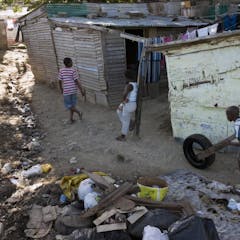
Articles on Hunger
Displaying 1 - 20 of 229 articles

Does weight come back when you stop taking drugs like Ozempic? Are these medications simply another (expensive) form of yo-yo dieting? Here’s what we know so far.

We don’t tell people taking statins to treat high cholesterol or drugs to manage high blood pressure they’re cheating or taking the easy way out. Nor should we when people take drugs like Ozempic.

South Africa’s national survey of food and nutrition security identifies the areas most in need.

A new UN report finds that the true global cost of producing food is $12.7 trillion more than consumers pay at the checkout counter. We pay those uncounted costs in other ways.

Arable land has been destroyed, as have food production sites. But even before the current operation in Gaza, Palestinians there suffered high rates of food insecurity.

You likely know that the sight and smell of food can trigger cravings. But internal cues from your gut and your brain play just as important a role in the decisions you make around food.

Budget cuts have resulted in increased hunger in camps in Uganda, Burundi and Kenya that house refugees from across the region.

When we change our diet, we disrupt our appetite hormones. Here’s how it works – and how small changes to our diet can help us feel fuller for longer.

With food insecurity at an all-time high and food banks buckling under high demand as we head into this holiday season, experts say we need to focus on long-term solutions to tackle the issue at its root.

The food theft crisis is framed as a threat to paying customers. This furthers the divide between those who can still afford groceries and those who cannot.

As global acute food insecurity increases, severe wasting — which already affects 13.6 million children — is expected to rise with it. Treating wasting requires specialized nutrition and medical care.

The persistence of food insecurity in Canada is a policy choice. By not doing more to improve the adequacy and stability of household income, governments are choosing to let food insecurity fester.

The Ukraine war’s impact on food insecurity is critical, but there is more to the picture. The main problem is that capitalism allows food and other basic needs to become precarious commodities.

People with diabetes in Liberia face a vicious cycle of hunger and neglect that can sometimes spiral out of control and put their lives in danger.

Did the Green Revolution, which brought high-tech agriculture to developing nations in the 1960s, prevent famine? Recent research takes a much more skeptical view.

The Nobel Peace Prize has recognized some legendary leaders and peace activists, but it has a mixed track record of recognizing people who actually deserve the prize.

But it may have an indirect effect on weight loss – especially if you swap it for the high-calorie drinks you normally have.

Low-income mothers with infants are struggling with food insecurity, which can lead to long-term health impacts for both mothers and children.

Russia’s move, which it followed by bombing the key port city of Odesa and threatening to attack any ship sailing for Ukraine, sent global food prices skyrocketing.

Social enterprises need to be proactive in improving their internal processes and structures. They also need to share essential information.





